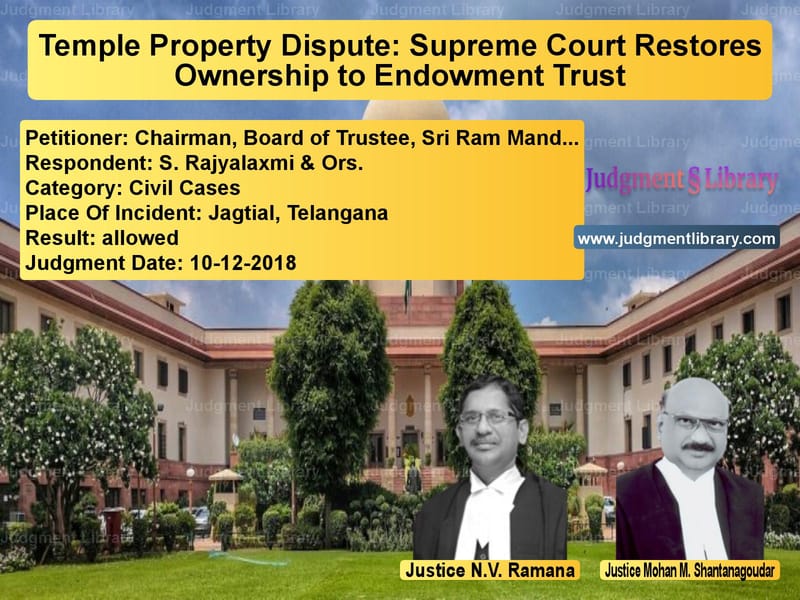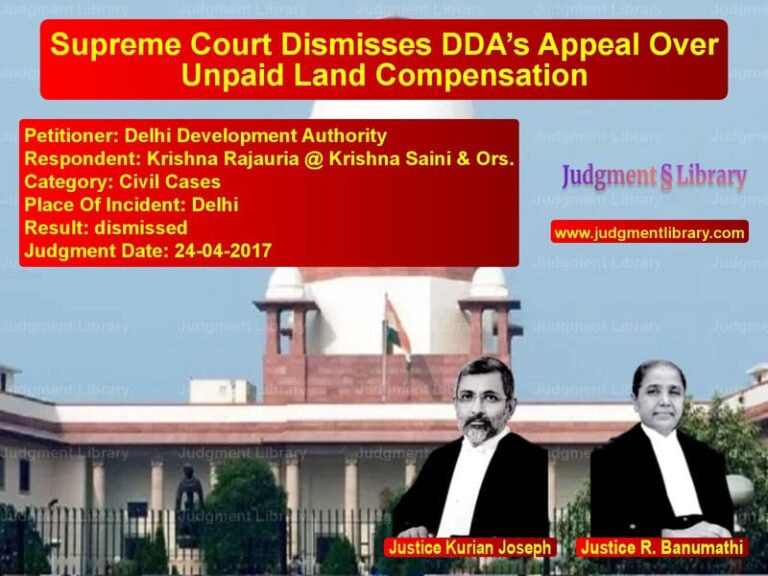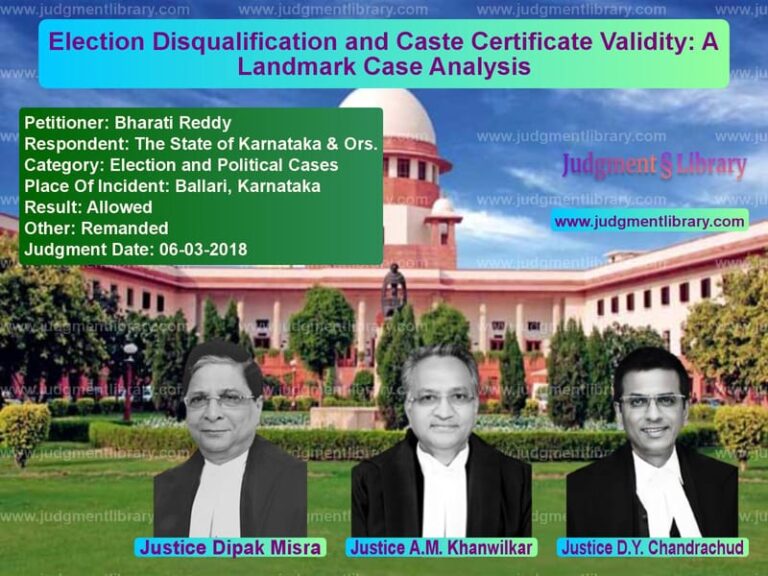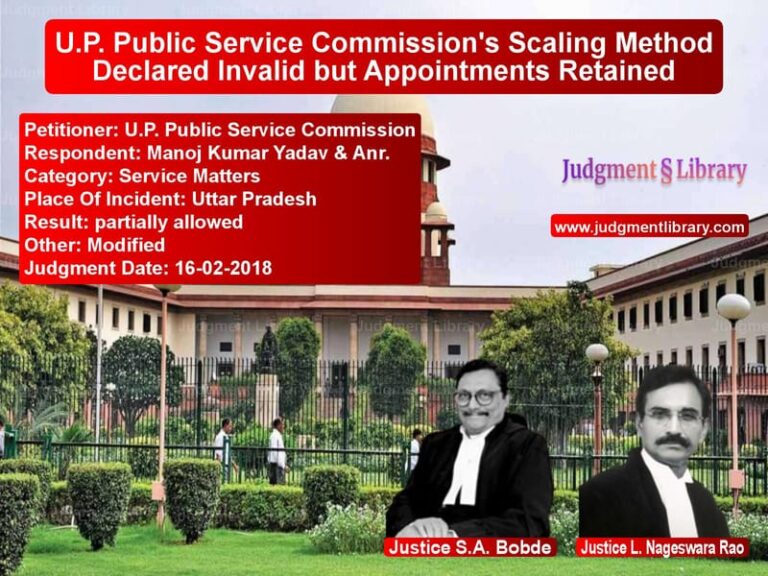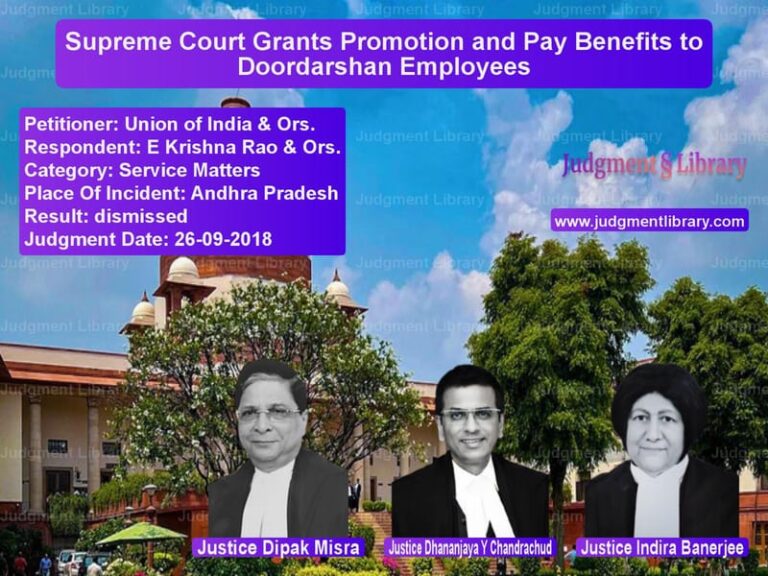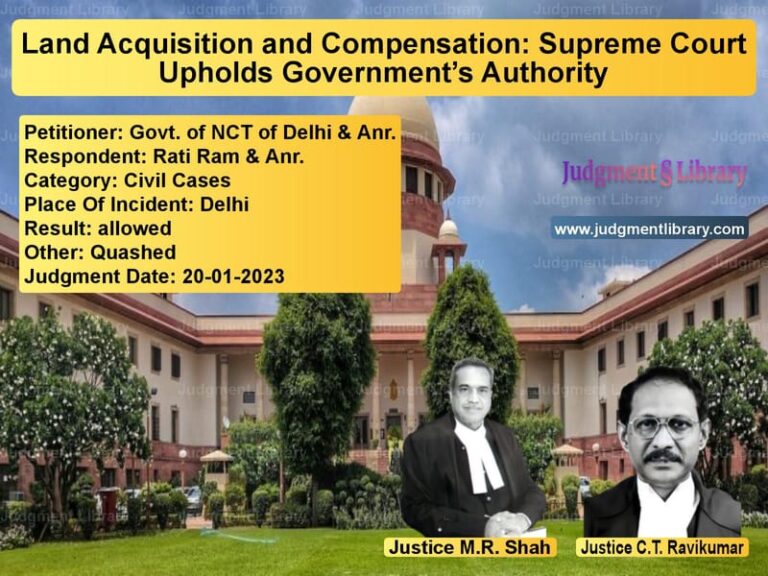Temple Property Dispute: Supreme Court Restores Ownership to Endowment Trust
The case of Chairman, Board of Trustee, Sri Ram Mandir Jagtial vs. S. Rajyalaxmi & Ors. is a significant ruling concerning property disputes involving religious endowments. The Supreme Court was called upon to decide whether the High Court was justified in declaring private ownership over land that was claimed to be temple property.
The dispute centered on the ownership of a house property (Schedule ‘A’) and certain other movable properties (Schedule ‘B’) claimed by the temple authorities as endowment property, while the respondents claimed private ownership. The Supreme Court ruled in favor of the temple trust, setting aside the High Court’s decree that had favored the respondents.
Background of the Case
The dispute began when the respondents, claiming to be the legal heirs of the property, filed a suit seeking a declaration of ownership over the suit schedule properties. The key developments in the case were:
- The original plaintiffs (respondents) filed a suit in 1987, seeking a declaration that they were the owners of the property and that it did not belong to Sri Ram Mandir.
- The trial court dismissed the suit, holding that the plaintiffs had failed to prove ownership and that the property was temple property.
- The respondents appealed to the High Court, which reversed the trial court’s decision and decreed the suit in their favor.
- The High Court ruled that the property had been recorded in the name of the respondents’ ancestors and that the temple authorities had no right to claim it.
- The temple trust, represented by the Board of Trustees, appealed the High Court’s decision in the Supreme Court.
Legal Issues Considered
The Supreme Court examined the following key legal questions:
- Did the respondents provide sufficient proof of ownership over the suit property?
- Was the property legally recognized as endowment land?
- Did the High Court err in overturning the trial court’s decision?
- Can municipal tax receipts and possession records be used as conclusive proof of ownership?
Arguments by the Appellants (Temple Trust)
The temple trust, represented by Senior Counsel, argued:
- “The property was recorded as an endowment property and was part of Sri Ram Mandir’s estate.”
- “The High Court wrongly relied on municipal tax receipts, which only indicate possession but do not establish ownership.”
- “The respondents manipulated records to show private ownership, but historical documents clearly show that the property was dedicated to the temple.”
- “The Deputy Commissioner of Endowments had already recognized the land as temple property, and this was not challenged by the respondents in earlier proceedings.”
Arguments by the Respondents
The respondents, represented by their legal counsel, countered:
- “The property had been recorded in their ancestors’ names, and they had been paying municipal taxes for decades.”
- “The temple authorities had never previously claimed the property as part of the endowment until the dispute arose.”
- “The High Court correctly evaluated the evidence and found that the temple trust had failed to prove ownership.”
Supreme Court’s Observations and Judgment
The Supreme Court, comprising N.V. Ramana and Mohan M. Shantanagoudar, overturned the High Court’s ruling and restored the trial court’s decision in favor of the temple trust. The Court held:
“It is a well-established principle that municipal records and tax receipts do not confer ownership rights. The High Court erred in relying on these documents without examining the historical records of endowment.”
The Court provided the following reasoning:
- The burden of proof was on the respondents to establish their ownership, which they failed to do.
- Endowment properties are protected under law, and private claims must be supported by substantial evidence.
- The earlier order by the Deputy Commissioner recognizing the land as temple property was not challenged by the respondents, making their claim legally weak.
- Possession alone is not sufficient to claim ownership in disputes involving religious endowments.
The Supreme Court concluded:
“The respondents have not established any legal right over the suit schedule property. The High Court’s order is set aside, and the order of the trial court dismissing the suit is restored.”
Implications of the Judgment
The Supreme Court’s ruling has significant implications:
- It reaffirms that municipal tax receipts and possession records do not establish ownership over disputed property.
- It upholds the protection of temple properties and prevents unauthorized claims over religious endowments.
- It clarifies that lower courts must rely on substantive documentary evidence rather than mere administrative records.
- It ensures that temple authorities retain control over properties legally designated as endowments.
Final Decision
The Supreme Court allowed the appeal and reinstated the trial court’s judgment:
“The judgment of the High Court is set aside, and the appeal is allowed. The property shall remain under the control of the temple trust.”
This ruling ensures that religious endowment properties remain protected and cannot be claimed without strong legal justification.
Petitioner Name: Chairman, Board of Trustee, Sri Ram Mandir Jagtial.Respondent Name: S. Rajyalaxmi & Ors..Judgment By: Justice N.V. Ramana, Justice Mohan M. Shantanagoudar.Place Of Incident: Jagtial, Telangana.Judgment Date: 10-12-2018.
Don’t miss out on the full details! Download the complete judgment in PDF format below and gain valuable insights instantly!
Download Judgment: Chairman, Board of T vs S. Rajyalaxmi & Ors. Supreme Court of India Judgment Dated 10-12-2018.pdf
Direct Downlaod Judgment: Direct downlaod this Judgment
See all petitions in Property Disputes
See all petitions in Succession and Wills
See all petitions in Landlord-Tenant Disputes
See all petitions in Judgment by N.V. Ramana
See all petitions in Judgment by Mohan M. Shantanagoudar
See all petitions in allowed
See all petitions in supreme court of India judgments December 2018
See all petitions in 2018 judgments
See all posts in Civil Cases Category
See all allowed petitions in Civil Cases Category
See all Dismissed petitions in Civil Cases Category
See all partially allowed petitions in Civil Cases Category

